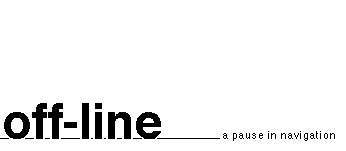E-mail is thirty years old. It would deserve a big
birthday party. Many of us (including myself) are more fond
of it than of any other of the countless things we can do
with the internet. But it’s suffering from a syndrome that
Gerry McGovern, in an article on November 4, 2001, rightly called
“too
much of a good thing”.
One of the diseases, of course, is spamming. It’s been
pestering us for many years and it’s getting worse. Also
because there are people preaching a “new” selling
technique called “e-mail marketing” – a fancy
disguise for online junk mail (in one word, spam.)
There seems to be no end to chain letters, sometimes
dressed up as “help” or “social” issues.
There are new twists to old tricks, such as an
“African”
variation of the traditional confidence game – and even a
repetition of the infamous 1994 “green card” swindle.
Spam may be the most obvious, but it’s not the only
disease in e-mail. There is the exaggerated use of
“attachments”, made worse by those mail systems
that open them automatically and so clutter us with masses of
uninteresting or unwanted material – and also open an easy
path for viruses. There is also the silly habit of using html
in e-mail (unfortunately set by default in the most commonly
used mail software). And there is the never-ending problem of
overquoting (this, too, made worse by mail systems that
automatically include the incoming message in every reply.)
I wrote a year ago about the
diseases in business
e-mail. Too many messages being copied to too many people,
too many documents being spread around for personal or
political reasons that have nothing to do with efficiency,
too many managers wasting time because they feel
“obligated” to read and answer personally on almost
any subject, too many people getting into the act (and
confusing the issue) by cross-posting and cross-messaging.
Etcetera. Disorganization and waste of time generated by
communication clutter and by inefficient use of business e-mail.
It seems to be getting worse. There is increasing
discussion of the “productivity paradox”.
Communication technology can decrease productivity instead of
improving it. It’s reported that in Aldi, an international
discount retailer chain, «none of the senior managers
(or lower levels) are allowed to have e-mail because it does
not aid productivity».
In July 2001, a Gartner study stated that business users
spend an average of 49 minutes every day managing their
e-mail. Gartner stated that much e-mail is not relevant. It
compared unproductive e-mail to «being killed by
friendly fire. It’s like carbon monoxide. It’s colorless,
odorless».
In May 2001, Support.com published a survey of IT
professionals globally which found that «e-mail software
caused the more problems than any other software application».
After quoting these and other sources on the
“productivity paradox”, Gerry McGovern says in his
article: «It looks like millions have become unwilling
participants in a great productivity swindle. The root cause
of the problem is a counter-productive thinking about content
and communication. Deep down, many of us fundamentally
believe that more and bigger is better. Communication and
content are not commodities. More communication can harm
rather than aid productivity. More content can mean more
wasted time. It’s time for some form of limit, some form of
penalty for those who clog up the information arteries».
This isn’t just a problem of quantity. Quality is even
more important. E-mail is so convenient that we tend to use
it carelessly. If everyone knew how to write only when it’s
useful, and only what is useful, in as few words as possible
and in the way that is best for the reader, there would be
much less clutter and e-mail would be much more useful.
The basic principle of all communication is that we
should think from the point of view of other people, say and
write what is relevant for them, not what seems interesting
to us.
There is an apparently small detail that can be quite
relevant. Proofreading. How many of us read a message and
correct it (making it clearer and possibly shorter) before
sending it? How many people ask themselves if what they have
to say is really useful, and if they are saying it in the
most useful way for the reader? Caring for people, and for
quality of communication, could not only improve productivity
but also make life much more pleasant for all of us.



